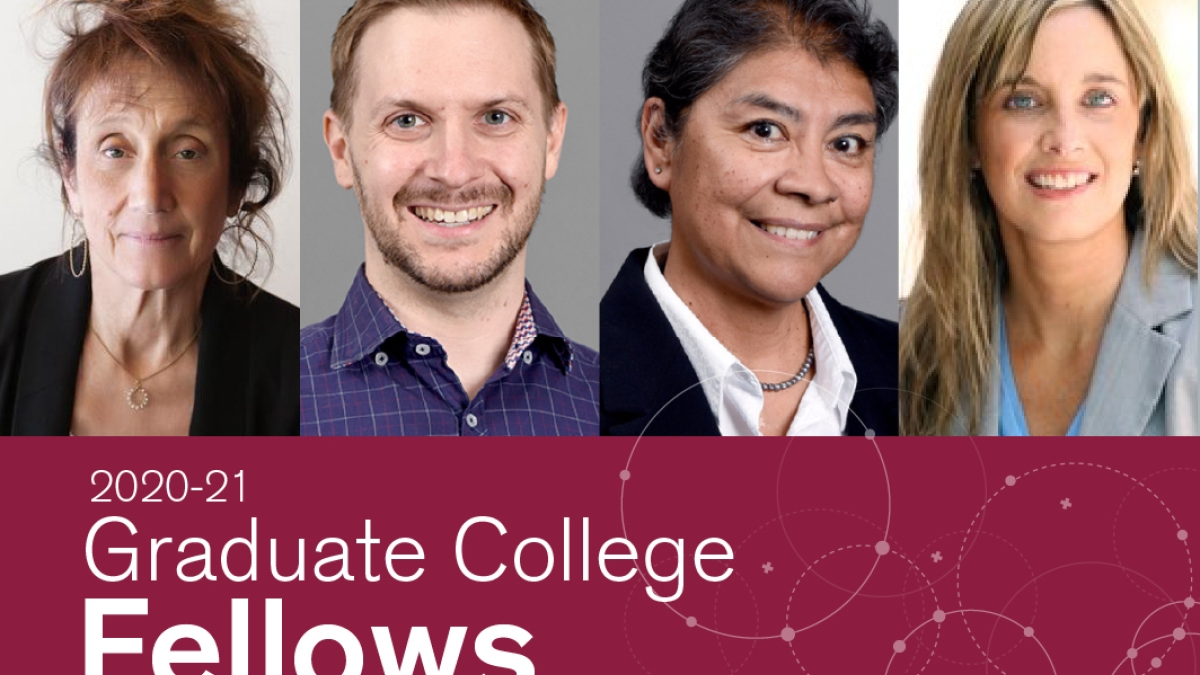ASU Graduate College announces 2020–21 fellows

2020–21 Graduate College Fellows Liz Lerman, Beckett Sterner, Delia Saenz and Kristy Holtfreter.
Each year, the Graduate College solicits individuals and teams of faculty to help the Graduate College advance key initiatives that improve graduate curricula across the university through the Graduate College Fellows initiative.
Last year’s Graduate College Fellows — Sally Kitch, an ASU Regents Professor, University Professor and President's Professor, and W. P. Carey Clinical Assistant Professor John Wisneski — collaborated to create the first comprehensive model for a new cross-campus experience: Interdisciplinary Solutions for Social Impact (ISSI).
Rooted in team-taught, project-based learning, ISSI will support interdisciplinary laboratories that bring together faculty and graduate students exploring complex social problems. The first ISSI labs are available in spring 2021 and focus on the theme “Impacting Inequality.” A number of ASU faculty members are participating in the 2020–21 lab.
The 2020–21 Graduate College Fellows
This year’s fellows include professors Liz Lerman, Beckett Sterner, Delia Saenz and Kristy Holtfreter. Over the next year, they will be working in three key areas: interdisciplinary collaboration in graduate education, inclusive practices across the graduate curricula, and academic and research integrity.
“The depth and variety of proposals we received from ASU graduate faculty for this year’s Graduate College Fellows competition were truly impressive,” said Vice Provost and Graduate College Dean Elizabeth Wentz. “This reflects the breadth of intellectual resources available within the graduate faculty at ASU .”
Interdisciplinary collaboration
Lerman, from the Herberger Institute for Design and the Arts, and Sterner, from the School of Life Sciences, will provide creative and constructive resources for students to explore transdisciplinary solutions to urgent societal problems.
As a transdisciplinary artist in the field of dance performance, Lerman is an exemplar of what innovation looks like at ASU. A recipient of a 2002 MacArthur Genius Grant and the first Institute Professor at the Herberger Institute for Design and the Arts, Lerman’s work explores questions such as, “Can I make data personal?;" "Is audience in art the same as audience in science?;" and "How can artists contribute to the world?” Her “Atlas of Creativity Tools” and “Critical Response Process” has been utilized by artists and educators both nationally and internationally to enhance learning and deepen dialogue between artists and their communities.
A philosopher interested in the life sciences, Sterner focuses on “pluralism in the information age through an emphasis on the social dimension of mathematical formalization.” This focus has brought him unique teaching and research opportunities that bridge history, the philosophy of science and the natural sciences together while integrating ethics and societal context into the curriculum.
Inclusive practices
Social psychologist Saenz, from the Department of Psychology, has long been a force for nurturing intergroup alliance and understanding in her research, teaching and administrative roles at ASU. Her research has looked at tokenism, faculty women of color in the academy, and ethnic identity development and acculturation for Latino youth. Her teaching has focused on stereotyping, prejudice and discrimination, gender disparities, group dynamics, diversity in contemporary society, and the social dynamics of inclusion.
Saenz’s inclusive practices fellowship project will be to design an evidence-based, integrated platform, using both face-to-face and online modalities for training graduate students across disciplines to understand the value to their field of engaging inclusive practice; learn capacity-building skills related to inclusive practice that can be applied during their graduate training and well into their future careers; and begin to develop diversity, equity and inclusion resources that they can benefit from directly and that can also benefit their specific disciplinary program and their field. Once in place, the new platform will be flexible to accommodate evolving understandings, technologies and approaches.
Academic and research integrity
Holtfreter, from the School of Criminology and Criminal Justice, will tackle the challenge of academic and research integrity for all graduate students by helping to scale up the resources currently available.
To deepen the experience, Holtfreter is piloting a three-credit graduate seminar covering topics like best practices in research collaborations, financial responsibility in grants, presentation of research findings and public communication. The seminar will form the basis of a multifaceted academic integrity curriculum for which the Graduate College will seek support in developing.
The Graduate College plans to share contributions made by the fellows with the ASU community each year.
More University news

ASU community exceeds goal, raises $835K for Valley of the Sun United Way
The Arizona State University community stepped up and raised over $835,266 for the Valley of the Sun United Way — exceeding the $…

ASU launches online ocean futures undergraduate degrees
Our oceans make up three quarters of the planet’s surface and contain most of its biodiversity. Due to rapid and global changes,…

ASU public affairs graduate programs rise to No. 11 in nation in US News & World Report’s 2025 rankings
Arizona State University rose to No. 11 nationwide for best graduate public affairs programs in U.S. News & World Report’s…

